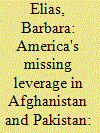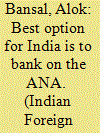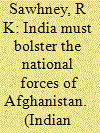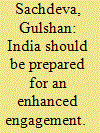| Srl | Item |
| 1 |
ID:
124210


|
|
|
|
|
| Publication |
2013.
|
| Summary/Abstract |
Despite strong shared interests and their dependence on US assistance, Kabul and Islamabad frequently fail to cooperate with the USA's post-9/11 security agenda. Why doesn't the USA have more leverage in these alliances and what can it change to be more influential? This article identifies four structural factors in Washington's alliances in Afghanistan and Pakistan ('Af-Pak') contributing to Washington's lack of coercive power: 1) the USA's interest makes coercion difficult; 2) Kabul and Islamabad have more invested and will bargain to protect their interests; 3) the form of US commitment (an intense but explicitly temporary military commitment) produces incentives for Kabul and Islamabad to adopt short-term solutions, frequently running against US interests; and 4) the tenets of counterinsurgency policy cause Washington to be politically dependent on Kabul and Islamabad, effectively reducing its influence.
|
|
|
|
|
|
|
|
|
|
|
|
|
|
|
|
| 2 |
ID:
124882


|
|
|
|
|
| Publication |
2013.
|
| Summary/Abstract |
Many analysts perceive that India should evolve a joint strategy with the Central Asian States to counter both the Taliban and Pakistani influence in Kabul. However, this has the grave disadvantage of being perceived as anti-Pakhtoon in Afghanistan's fractured ethnic mosaic. Similarly, any coalition with Iran is likely to be perceived as anti-Sunni by the dominant sect in Afghanistan. In addition, considering the current state of US-Iran relations, any relationship with Iran has a risk of running afoul of the USA. The best option for India is to bank on the ANA and pro-India politicians in Afghanistan. India must not allow it to be side-lined on Afghanistan as was done in the Turkey and London Conferences. There are many Afghan politicians who are willing to do India's bidding.
|
|
|
|
|
|
|
|
|
|
|
|
|
|
|
|
| 3 |
ID:
124881


|
|
|
|
|
| Publication |
2013.
|
| Summary/Abstract |
If India has to stay relevant in Afghanistan, it must do all to bolster the national forces of Afghanistan. This can be done by combining India's considerable soft power with that of other regional countries, and pool together diplomatic, political, and military resources with other countries to support Afghanistan's war against disruptive forces. Banking only on things like an UN-mandated international security force or a regional treaty which forswears interference in Afghanistan, is a futile game because it will have no worthwhile mechanism for enforcement.
|
|
|
|
|
|
|
|
|
|
|
|
|
|
|
|
| 4 |
ID:
124880


|
|
|
|
|
| Publication |
2013.
|
| Summary/Abstract |
Irrespective of what happens between Afghanistan and the US on bilateral security agreement as well as on the Afghan peace process, it is clear that a new phase in the Afghanistan project is going to begin from 2015. Within this context, most analysts and international reports indicate that, in the post-2014 phase, the country is going to face major challenges in three major areas: security, political and economic. Enhanced Indian engagement in Afghanistan could help the country meet the difficult challenges in all these areas during its decade of transformation (2015?2024).
|
|
|
|
|
|
|
|
|
|
|
|
|
|
|
|